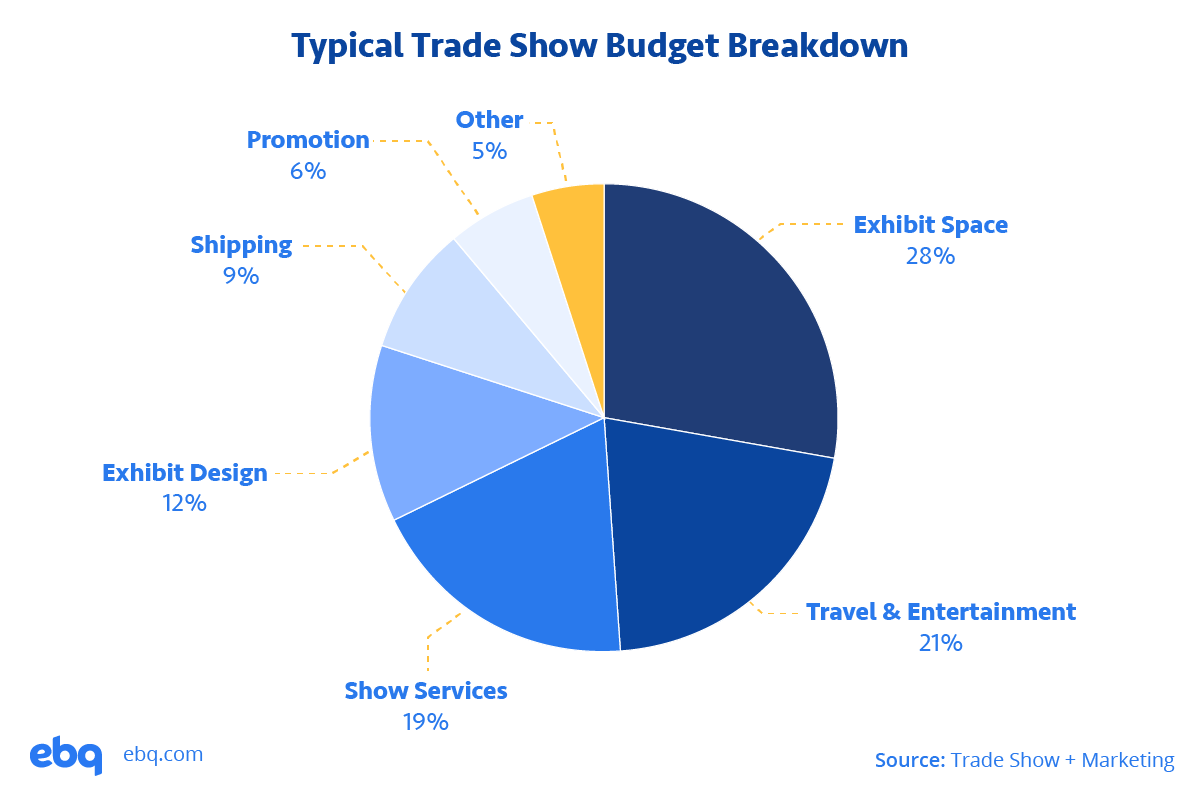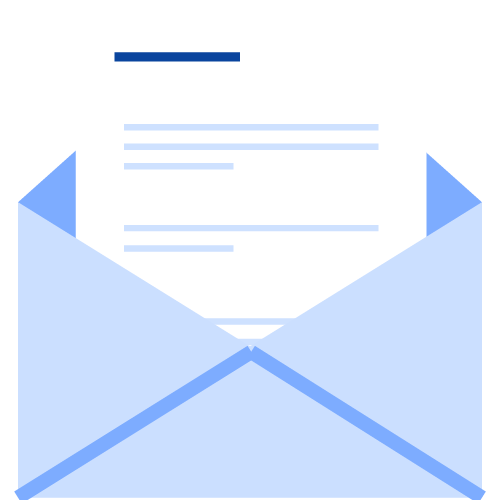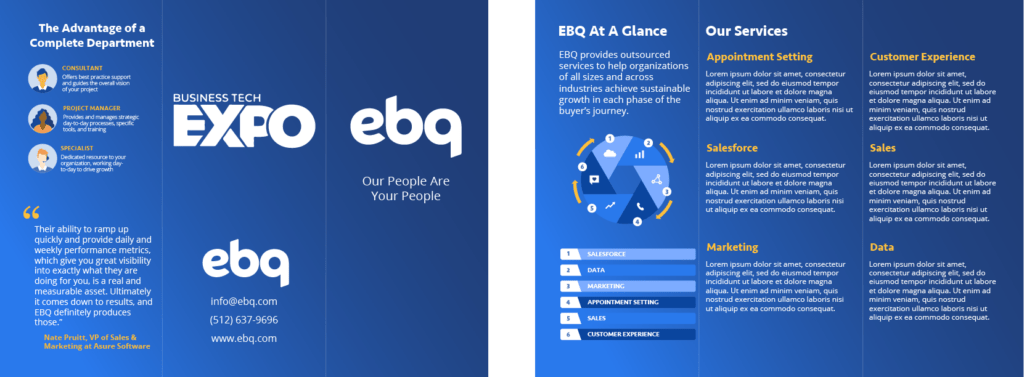Essential Trade Show Checklist: Everything You Need To Succeed


Brent Walrath
This post was originally published in April 2024 and has been updated for accuracy and comprehensiveness.
Trade shows are powerful tools to stay up-to-date with industry developments, connect with like-minded peers, and network with decision-makers. In fact, studies show that companies can see up to 400% ROI from trade show costs. That said, your ROI hinges on how well-prepared your team is to attend such an event. Kick-start your preparation process by downloading our essential trade show checklist.

Download EBQ's Trade Show Planning Checklist
Are you attending an event as a trade show exhibitor? Download our free checklist to properly prepare for the event.
As a general rule of thumb, we recommend giving your team at least 8 weeks to prepare for the event. Our eight steps are:
- Define your goals
- Perform adequate research
- Set a realistic budget
- Select your team
- Design your booth
- Promote the event
- Actively participate in the show
- Follow up promptly
1. Define your goals
Did you know that 13,000 trade shows take place in the United States every year? This means that you need to be selective in which event you attend.
It all starts with you defining your goals. What do you want to get out of attending a trade show? Here are some quick statistics to consider:
- Converting a trade show lead is 36% less expensive than relying on sales calls alone
- Trade shows boosts brand recognition by 76%
- 65% of trade show participants agree that attending trade shows helps them better understand products and services
- 79% of trade show attendees believe that attending trade shows helps them make purchase decisions
Many business leaders want to attend trade shows to increase brand awareness or generate higher-quality leads. Whatever your goal may be, make sure to set SMART goals to hold your team accountable to attainable performance targets.

Here are a few examples of trade show SMART goals:
- On the day of the event, we’ll gather 100 MQLs’ information to follow up on
- 2 days after the event, 50 people will open our first follow-up email
- 1 month after attending the event, we will set 10 sales appointments
After defining your goals, you’ll want to select which trade shows to attend.
2. Perform adequate research
As mentioned earlier, you should give yourself an 8-week lead time to properly prepare for a trade show.
If your initial goal is to set higher-quality leads, we recommend choosing a trade show where prospects matching your ICPs will meet. After all, you will be meeting with many decision-makers face-to-face and striking up conversations; just like any marketing or sales campaign, it’s important to meet your prospects where they are.
EBQ Tip: Many business leaders are often tempted to discount smaller, local events. However, you should not discount such events, as they often bring in more specialized organizations within your industry.
Furthermore, there will be fewer booths to compete with — making it easier to stand out and hold longer, productive conversations.
3. Set a realistic budget
Typical trade show exhibitors can expect to spend at least $5000, but that depends on how elaborate your booth will be. While you certainly don’t need the most expensive setup, there are a few things you should account for in every trade show event:
- Traveling and accommodation
- Booth activity (e.g., prize wheel)
- Tablet or laptop for form collection
- Business cards and one-pagers
- Box to collect prospect business cards
Here’s a typical trade show budget breakdown:

After determining what your budget looks like, you can determine how many people you can afford to send to represent your brand.
4. Select your team
Now comes the difficult part: deciding who to send to the trade show. Since almost half of all trade show participants hold senior executive positions, you need to send someone to set the best first impression.
Here are a few personality traits we look for when we choose who to send out on a trade show:

- Personable
- Sociable
- Approachable
- Assertive
- Knowledgeable
Since these people are often the first ones to respond to objections, you need to send someone who can confidently communicate your brand value.
EBQ Tip: Most business leaders would send their top salespeople to trade shows, which makes sense since you need to send someone who can foster strong business relationships.
However, you should also consider sending technical experts if you are promoting a complex product launch. That way, they can answer more complex questions on the spot to set the best first impression.

Subscribe to EBQ's Bimonthly Newsletter

Subscribe to EBQ's Bimonthly Newsletter
5. Design your booth
Now comes the fun part: creating your booth. But before you ask your visual designers to pick up their pens, you need to ask yourself:
- Who is going to be there?
- How many people might stop by?
- How big is your booth?
- How are you going to attract people to your booth?
- Where is your booth located?
Start your design process by identifying the interactive element of your trade show booth. Your goal is to keep people engaged when they’re near your booth. Some common interactive elements include:
A photo booth
A refreshment station
A quiz game
A prize wheel
EBQ Tip: We’ve found a lot of success in setting up our booths next to key points of interest that could have a waiting line — such as restrooms, coffee shops, and charging stations. That way, you can draw people to your booth as they are idly waiting.
As far as design goes, we recommend going for a simple, cohesive, yet eye-catching design. Consider creating a custom banner, tablecloth, and anything that will cover your rental equipment to stand out from the crowd.
If you need help creating branded materials, consider partnering with our Graphic Designers. We specialize in creating eye-catching and intuitive designs that are fit for any print medium and digital channel.
6. Promote the event
Contrary to popular belief, you should be promoting the event before you attend the show. That way, you can build excitement for both the event and for meeting you in person.
One of the most efficient ways to promote your attendance is by leveraging marketing automation tools, such as a drip email campaign. 76% of exhibitors integrate their trade show participation into other marketing campaigns; this means that marketers often use these trade shows to tie into their brand value to inspire conversions.
You also need to create an email marketing series that promotes your trade show appearance. Start by finding the right prospects to promote this trade show to. If you’re struggling to find the right people to email, let our Data Technicians handle it; they can find and verify contact information to help get you started. Visit our B2B Data Services page to learn more.
As you are sending out your emails, your content writers and graphic designers need to create eye-catching sales collateral. Since they will act as your leave-behind, your sales collaterals need to create a positive long-lasting impression.

EBQ Tip: If your goal is to generate more leads, make sure to create a designated landing page for the event with a lead capture form. We find that keeping things short and sweet allows for quicker form fills, which allows for more people to sign up.
Make sure you are working with professional marketers to help launch these complex marketing campaigns. That way, you are maximizing your trade show attendance’s impact — even before you enter the event hall.
7. Actively participate in the show
It’s event day! Before your team heads out to the event hall, here is a quick checklist of things to bring:
- Common Objections and Responses cheat sheet
- Plenty of marketing materials (one-pagers, business cards, etc.,)
- At least 1 lead capture device
- Your interactive feature
- A box to collect prospect business cards
Remember to have fun! Your goal is to try to make as many connections as possible. Don’t worry too much about the “quality” of the conversations just yet, as you can determine that later in the follow-up.
8. Follow up on leads promptly
Now that the event is over, it’s time to take the next steps to turn those connections into opportunities. Start by quickly adding all the contact information you collected to your CRM.
Surprisingly, only 6% of exhibitors are confident in their ability to convert a trade show lead into a paying customer. This means that most organizations do not have an adequate follow-up process that allows for higher conversions. If you find your follow-up processes lacking, consider partnering with our B2B Lead Generation team. We developed our touch cadence that promotes better follow-ups with the least amount of resistance.
EBQ Tip: We previously wrote a blog post on “Following Up on Trade Show Leads Through Sales and Marketing”. There, you’ll gain insight into how to use both your sales and marketing teams to circle back with your trade show leads effectively that’ll ultimately lead to sales.

Download EBQ's Trade Show Planning Checklist
Are you attending an event as a trade show exhibitor? Download our free checklist to properly prepare for the event.
Trade Show Planning: Simplified.
There’s a reason why attending trade shows remains a popular way to increase your brand presence; Those who attend trade shows are 72% more likely to buy from an exhibitor than a competitor.
But you can only maximize these opportunities if you are well-prepared for your trade show. As a recap, here are the eight steps to get ready for a trade show:
- Define your goals
- Perform adequate research
- Set a realistic budget
- Select your team
- Design your booth
- Promote the event
- Actively participate in the show
- Follow up promptly
If you need help designing your trade show event booth and promotional material, consider partnering with EBQ’s full-service marketing agency. At one flat retainer fee, you can partner with our Web Developers, Content Writers, Visual Designers, and Digital Marketers to create your trade show marketing literature. Visit our marketing services page to learn more.
About the Author:
As VP of Marketing at EBQ, Brent has led over 500 lead generation projects at EBQ, specializing in methodical execution and implementing best practices. With 14+ years of experience, including serving as Chief Revenue Officer, he has refined sales fundamentals and optimized processes for diverse industries, driving success in a dynamic market.
